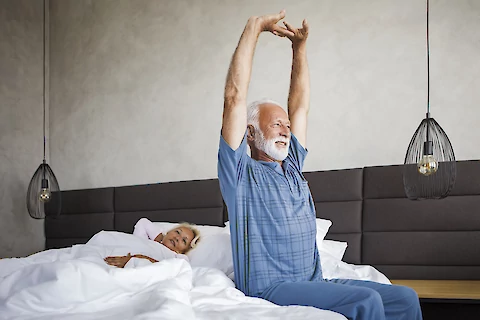
A Guide for Seniors to a Good Sleep Without Medication
Adults need seven to nine hours of sleep daily regardless of their age. However, our sleep patterns tend to change naturally as we grow older. The melatonin and hormone levels shift may lead to disturbed sleep, sleeping early, light sleep, waking early, and daytime fatigue. Good sleep is essential for good health, like regular exercise and balanced nutrition. It repairs damaged cells, refreshes the immune system, improves focus and memory retention.
Sleeplessness in older adults may lead to depression, weight issues, diabetes, increased falls and accidents, concentration and memory problems.
Read on for practical tips to develop good sleep habits for the elderly.
4 Tips to Getting a Good Sleep
Understanding the root cause of your sleeping issues is crucial for improving your sleep quality. There are varying causes of insufficient sleep among the elderly, including physical pain, sleep disorders, medication, alcohol use, as well as stress. You should see your doctor if you are experiencing sleep problems.
Here are some easy practices seniors can include in their lifestyle to better their sleep.
1. Change Your Sleeping Environment
Noise, temperature changes, as well as artificial light, can suppress melatonin production, thus affecting your sleep. Turn off the computer and TV at least an hour before bed. Also, avoid reading from devices with backlights like iPads and tablets at night.
Training your mind to associate your bedroom with sleep is vital for good sleep. Keep your bedroom only for sex and rest. Your room should be dark, quiet and with a comfortable bed. You can use earplugs, sleep masks, or a sound machine to block out any distractions.
2. Regular Bedtime Routine
Finding a routine that works for your needs facilitates training your mind and body for sleep. Maintain a sleep schedule by getting to bed and waking up at the same time every day, even during holidays.
Avoid late-night stimulation and instead develop soothing bedtime rituals. Take a warm bath, play quiet music, do light reading and try progressive muscle relaxation like deep breathing and meditation to wind down. You can also block out snoring using a white noise machine but limit sleeping pills and sleep aids.
3. Napping
Although napping can boost your energy during the day, it is a bad habit for people with insomnia. Naps are good if they don't keep you awake at night. When napping, do it in a comfortable environment and keep it short. A 15-to-45-minute nap in an early afternoon can keep you alert for the rest of the day.
4. Diet and Exercise for Improved Sleep
Diet and exercise, especially before bedtime, affect sleep. Some diet tips to improve sleep quality include:
- Limiting caffeine intake
- Avoiding alcohol before bedtime
- Cutting down on sugary food
- Taking light snacks like warm milk or yogurt
- Avoiding big and spicy meals before bedtime
- Limiting liquid intake to prevent regular visits to the bathroom at night
Aerobic exercise controls stress and promotes restful sleep. There are also numerous exercises that you can engage in even with immobility issues. Always consult with your doctor before undertaking any new fitness program.
Final Remarks
Sleeplessness can be a vicious pattern without good sleeping habits. Non-medication solutions should be a priority in improving sleep for seniors. With a regular bedtime routine, a conducive sleeping environment, early napping, stress control, and proper diet and exercise, you can enjoy sleep again.
Contact our friendly and knowledgeable staff at Seniors Helpers of Baltimore for any questions on developing good sleep habits for quality rest.